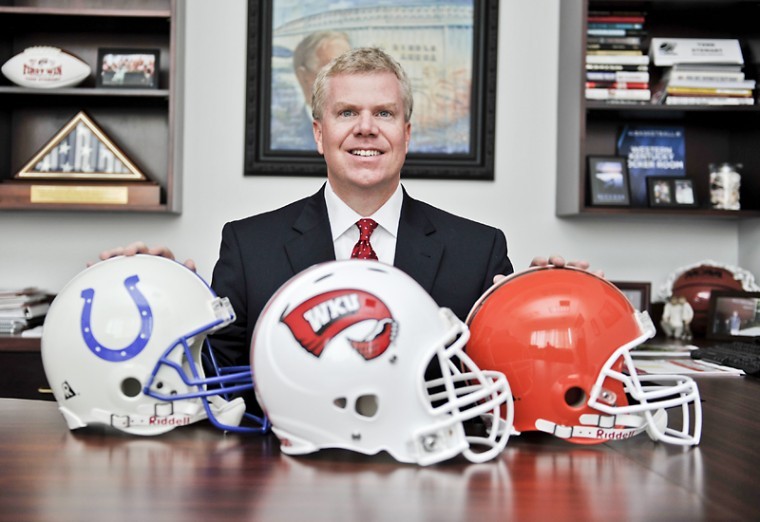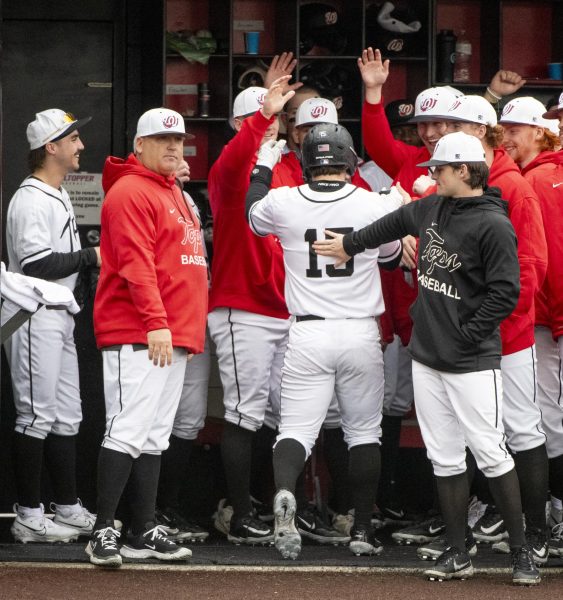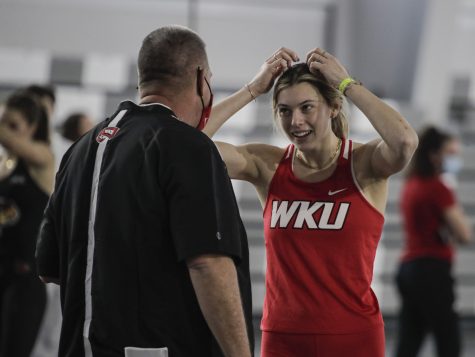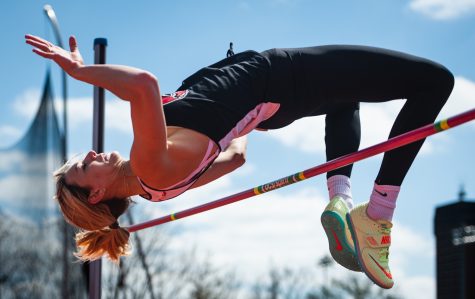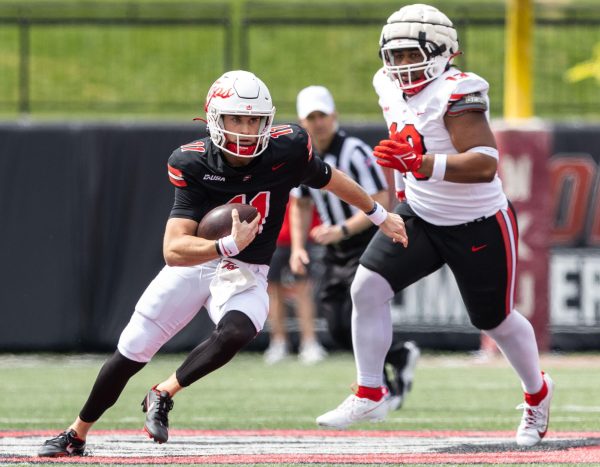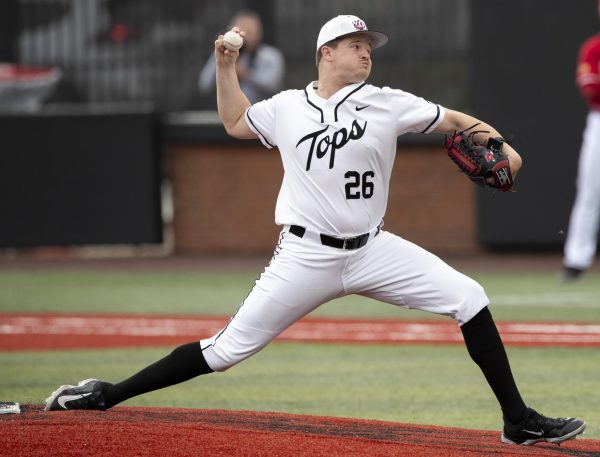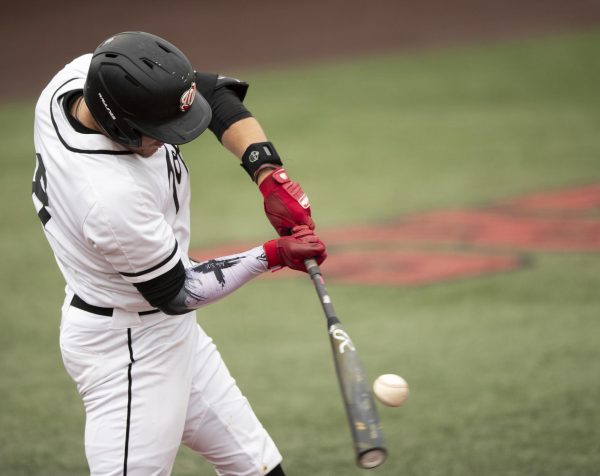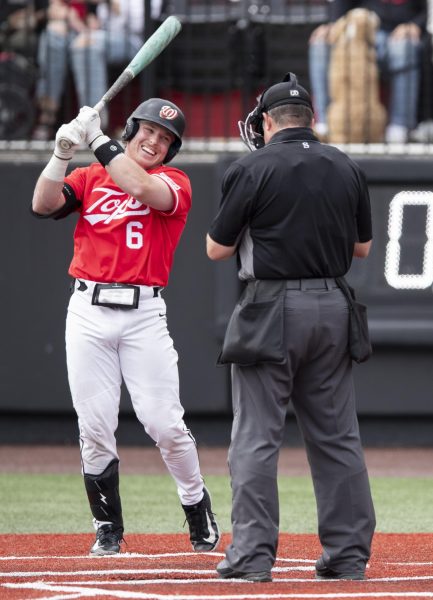AD Stewart comes from NFL past to lead WKU sports
August 28, 2012
Carmen Policy said it wasn’t a typical new team ‘love affair’ when he took over the Cleveland Browns in 1998.
The Browns would be coming back to the NFL in 1999 after a former owner moved the original Browns to Baltimore in 1995.
Despite the Browns’ comeback, there was still ‘saltiness’ among fans and local media over the original move, Policy said.
So Policy, a former Super Bowl-winning executive, looked for a communications director to handle the delicate situation.
He hired Todd Stewart, then one of the top media relations men with the Indianapolis Colts.
Policy said it was one of the best moves he made in Cleveland.
“He was engaged in combat duty, so to speak, every day of the week and he just handled it with tremendous aplomb and maturity that seemed to be way beyond his years,” Policy said.
A decade and a half later, Stewart, 46, is back in the public eye, as he became WKU’s 15th athletic director on May 9.
Stewart had already been named interim AD in March after Ross Bjork left for Mississippi.
In the four years prior, Stewart had overseen WKU’s athletic media relations office and become No. 2 in the athletic power structure.
While his selection was an internal promotion rather than an external hire, he doesn’t want his employees “putting it on cruise control,” he said.
“Sometimes when someone gets promoted from within, there may be a feeling among some that the status quo is great and the status quo is acceptable,” Stewart said. “It’s not… There are things we can achieve that we haven’t achieved before.”
A coach’s son
Todd Stewart’s career in athletics began early in childhood.
His father, Colin Stewart, was an assistant basketball coach at Austin Peay for three years in the early 1970s.
Todd, who was in elementary school, went with his father on recruiting and scouting trips.
“He was really a joy sitting with coaches and keeping shot charts and statistics and seemed to have an understanding and a background of the game for a very young boy,” Colin said.
Todd also traveled with the Austin Peay team to nearby games, including those at WKU, as the Governors and Toppers were Ohio Valley Conference rivals then.
Being in locker rooms around college coaches and players also gave him “a foundation” for his future career, Colin said.
“He not only heard our discussions but sensed there are some ups and downs in this business,” Colin said.
Colin got out of coaching after Austin Peay and Todd, his younger brother, Mark, and his parents moved back to Cincinnati, their hometown.
He grew up cheering for the Big Red Machine-era Cincinnati Reds of the mid-1970s, playing the part of his Reds heroes like Johnny Bench, Joe Morgan and Pete Rose during backyard baseball games.
Todd played basketball and baseball while a student at Cincinnati’s Sycamore High School, though not with the success of his idols.
“I loved to compete and loved to play, but the scouting report would probably say ‘Stewart’s very average,’” Todd said.
While Todd wasn’t the team star, Colin said sports brought out qualities in his son that would pay future dividends.
“You couldn’t tell if he went 3-for-4 or 0-for-4,” Colin said. “He was more interested in how the team did and he was very interested in his teammates. Their success seemed to supersede anything he would do.”
Todd went to Miami (Ohio), majoring in communications before earning a master’s at Tennessee.
The UT experience set Todd on his career path, he said.
“…They had such high expectations for everything and they expected excellence,” he said. “That’s when it became crystal clear to me that that’s what I wanted to do.”
From there he sent resumes and cover letters to each NFL, NBA and MLB team, along with the pro golf and tennis tours.
He finally landed a seasonal internship with the Indianapolis Colts.
‘In my heart’
Todd Stewart received six years of education at two major universities. He’d worked in an SEC media relations department at UT and as a Colts intern.
So what was he making when the Colts created a full-time position for him in 1991?
“My starting salary was $15,000,” he said. “That’s not probably what you think about going to college.”
But the fact Stewart was doing what he loved made salary less important, he said.
“I wasn’t doing it for the money, I was doing it because that’s what was in my heart and that’s what I enjoyed doing,” he said.
Stewart worked for the Colts from 1991-1999, writing press releases, marketing in the community and conducting interviews and press conferences.
During his time with the Colts, he served as a handler for quarterbacks Jim Harbaugh and Peyton Manning.
But Larry Hall, Colts VP of ticket sales, said much of Stewart’s impact came not in his work with stars, but in “shepherding” less heralded players who had never worked with media.
He did similar work in Cleveland, Policy said.
“He started explaining that even the comments you make to your barber or your friend who lives next door can find their way into the press and perhaps even lose perspective,” Policy said. “He found the right way to get across to these young athletes who needed coaching so badly in that particular area.”
But Stewart’s career was altered when owner Randy Lerner released Stewart and the Browns’ other vice presidents in 2004.
His next job came in the college ranks as associate commissioner of communications with the Sun Belt Conference, a role he held from 2005-2008.
During that time, one Sun Belt school stuck out to him, Colin Stewart said.
“We were discussing the conference and its teams and I remember him explicitly saying that Western Kentucky had the most successful programs,” Colin said. “I think he was very impressed with the quality of people he met at WKU.”
‘Don’t settle, be proactive’
When Stewart was hired by WKU AD Wood Selig in 2008, one of the first places he looked at was Smith Stadium’s press box.
The football Toppers were making the transition from Division I-AA (now known as the Football Championship Subdivision) to Division I-A (Football Bowl Subdivision).
WKU was still I-AA when it came to the press box, Stewart said.
“When you walked in that press box, it didn’t say I-A,” he said. “We needed to paint it. We needed carpeting.
“We needed new chairs, we needed new countertops, we needed some signage and some logos up there… Dress it up.”
The press box renovation led by Stewart was one of the projects that put him in line for a promotion to senior associate AD in 2010.
Then when Bjork left for Ole Miss Stewart became interim replacement.
It was that probationary period when Stewart earned the full-time job, president Gary Ransdell said.
“I took my time with that search process on purpose,” Ransdell said. “Once I made Todd the interim AD I wanted sufficient time to observe him.”
“…I could see a difference in our athletic department.”
Ransdell spoke with some other candidates but didn’t invite any to WKU for formal interviews, instead sticking with Stewart.
His five-year contract grabbed attention because of the $1 million buyout that must be paid should he leave before the end of the deal.
On the buyout, Ransdell said, “I should’ve done that with Ross (who stayed for two years).”
“I want Todd to knock ‘em dead and I want people banging at the door to come after him,” Ransdell said. “I think we can keep him, but if for whatever reason he does get lured away, someone’s going to have to pay serious money to even talk to him.”
Stewart said he was fine with the buyout, saying his wife, Rebecca, and son, Blake, 12, are happy at WKU and in Bowling Green.
As for his vision for the department, Stewart has placed signs throughout Diddle Arena’s athletic offices that read “Don’t settle, be proactive.”
Greater postseason success across all sports, sold out stadiums, perfect graduation rates, NCAA compliance and continual facility improvements will be priorities for Stewart’s department, he said.
“Yes, we’ve had a lot of success and yes, we’ve achieved a lot, but don’t be content,” Stewart said. “There are things that we haven’t achieved that we can achieve and that’s really what we need to be focused on now.”

